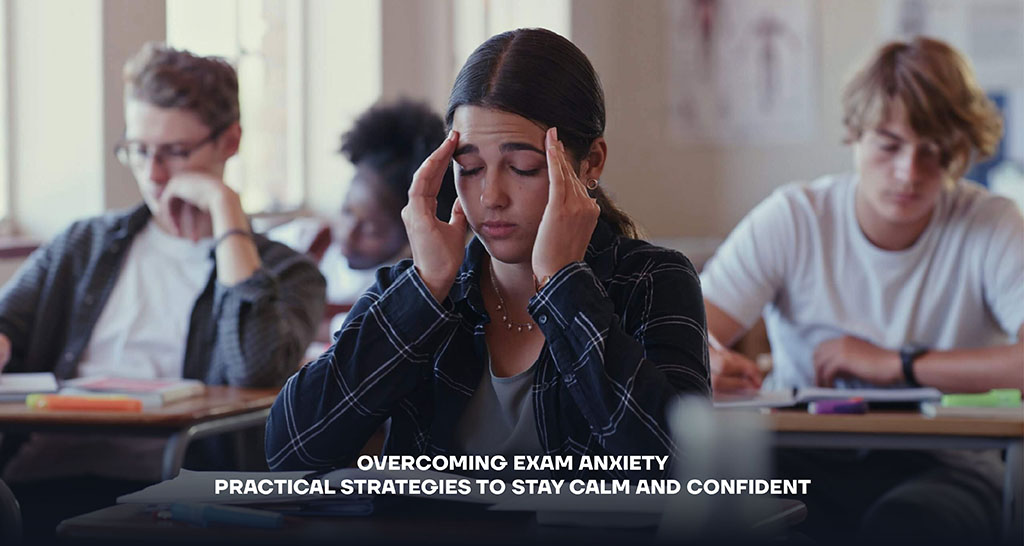Exam anxiety is a prevalent issue that impacts students across various age groups, ranging from young children in elementary school to adults engaged in higher education or seeking professional qualifications. The demand to achieve high performance can lead to stress, self-doubt, and apprehension, which frequently hinder concentration, memory recall, and task completion. Nevertheless, by utilizing effective strategies, students can develop skills to manage their anxiety and enhance their confidence. This article offers guidance on overcoming exam anxiety through a blend of mental and physical approaches.
Understanding Exam Anxiety
It is essential to comprehend the nature of exam anxiety prior to exploring strategies to manage it. Exam anxiety manifests as feelings of apprehension or fear that occur before or during an examination. While a moderate level of stress can serve as a motivating factor and enhance performance, excessive anxiety can detrimentally impact cognitive functioning and overall health. Typical symptoms encompass rapid thoughts, perspiring hands, trouble breathing, and a feeling of being overwhelmed. Such responses can hinder memory retention, decision-making, and problem-solving skills, thereby transforming the anxiety into an obstacle to achievement.
- Start Preparing Early
A highly effective method for alleviating anxiety is thorough preparation ahead of time. Procrastination significantly exacerbates exam-related stress, as it fosters a feeling of urgency and insufficient readiness. Initiating your studies early allows for sufficient time to review the material, practice test-taking techniques, and deepen your comprehension of the subject matter. By dividing the study content into smaller, more manageable sections and establishing a well-defined timetable, you can mitigate the apprehension associated with being unprepared.
Tips for Effective Preparation:
Create a study plan: Arrange your study sessions by subject, establishing clear objectives for each one. This approach aids in alleviating feelings of being overwhelmed.
Use active learning techniques: To enhance your understanding of the material, actively interact with it by utilizing practice tests, flashcards, and by instructing others, rather than merely reading notes.
Avoid cramming: Studying intensively the night prior to an examination heightens anxiety levels and hampers the brain’s ability to effectively retain information. It is advisable to distribute your study sessions over a longer period.
- Practice Mindfulness and Relaxation Techniques
Mindfulness and relaxation techniques serve as effective strategies for alleviating anxiety and maintaining composure in stressful circumstances. Mindfulness entails directing your attention to the present moment, which aids in soothing the mind and diminishing the inclination to dwell on negative thoughts. Consistent engagement in mindfulness practices can condition your brain to remain concentrated, even when confronted with challenging situations.
Mindfulness Strategies:
Breathing exercises: Deep, measured breaths can trigger the body’s relaxation mechanism. One effective method consists of inhaling deeply for a duration of four seconds, holding the breath for an additional four seconds, exhaling over four seconds, and then pausing for four seconds before commencing the cycle again.
Progressive muscle relaxation: This method consists of systematically tensing and subsequently relaxing each muscle group throughout the body, facilitating the alleviation of physical tension associated with anxiety.
Guided imagery: Envisioning a serene and tranquil setting or picturing yourself achieving success in the examination can effectively mitigate negative thoughts and alleviate stress.
- Maintain a Healthy Lifestyle
Physical health is crucial for optimal mental performance and emotional resilience. Adequate rest, proper nutrition, and regular physical activity enhance your ability to manage stress and maintain concentration while preparing for exams.
Health Tips for Exam Success:
Get enough sleep: Strive to obtain 7 to 9 hours of sleep each night, particularly in the days preceding your examination. Adequate sleep is crucial for the consolidation of memory and the functioning of cognitive processes.
Eat nutritious meals: A well-rounded diet comprising proteins, complex carbohydrates, and healthy fats can enhance cognitive function and maintain energy levels. It is advisable to limit the intake of caffeine and sugar, as these substances may lead to increased restlessness and interfere with sleep quality.
Exercise regularly: Engaging in physical activity has the potential to diminish stress levels and enhance overall mood. Even brief walks or mild exercises can lead to improved concentration and a reduction in feelings of anxiety.
- Develop Positive Thinking and Self-Talk
Negative thinking significantly contributes to the intensification of exam anxiety. Pessimistic thoughts like “I will fail” or “I am inadequate” can lead to a self-fulfilling prophecy. By cultivating the ability to substitute these negative thoughts with positive affirmations and realistic viewpoints, individuals can greatly alleviate their anxiety.
Tips for Reframing Negative Thoughts:
Challenge irrational beliefs: Consider whether the negative thoughts you are experiencing are grounded or merely assumptions. Substitute these thoughts with more rational and positive affirmations.
Affirmations: Utilize affirmative self-dialogue to enhance your confidence. Reflect on your preparation and previous achievements by affirming statements such as, “I have diligently studied and am well-prepared for this.”
Visualize success: Envision yourself entering the examination room with a sense of calm and confidence, diligently working through the exam with concentration, and experiencing a sense of pride in your accomplishments.
- Manage Exam Day Stress
The morning of the examination frequently represents the most anxiety-inducing aspect of the overall experience. Nevertheless, adopting a composed and methodical mindset can establish a positive atmosphere for the remainder of the day.
Strategies for Exam Day:
Arrive early: Arriving ahead of schedule at the examination venue can help alleviate unnecessary stress and provide an opportunity to acclimate to the environment. Conversely, hurrying to the exam can heighten feelings of anxiety.
Stay hydrated and eat a light meal: Low blood sugar levels or dehydration may lead to challenges in maintaining focus; therefore, it is essential to consume a nutritious breakfast and stay adequately hydrated by drinking sufficient water.
Avoid negative talk: It is advisable to refrain from participating in discussions with individuals who are conveying anxious or negative sentiments. Concentrate on your own preparations and uphold a positive outlook.
Practice relaxation techniques: Prior to the commencement of the examination, allocate a few moments to practice deep breathing or mindfulness techniques to alleviate any anxiety.
Conclusion
Addressing exam anxiety is a gradual journey rather than a swift solution. By utilizing effective strategies such as early preparation, mindfulness practices, maintaining healthy habits, fostering positive thoughts, and implementing stress management techniques, students can significantly enhance their ability to stay composed and self-assured during examinations. It is important to acknowledge that feeling anxious before an exam is a common experience; however, with appropriate resources, one can reduce this anxiety and achieve optimal performance. By consistently taking small steps to manage stress and develop resilience, individuals will not only improve their exam outcomes but also acquire valuable skills for managing pressure throughout their lives.










